九年级英语第三单元知识点完整版
- 格式:doc
- 大小:79.00 KB
- 文档页数:8
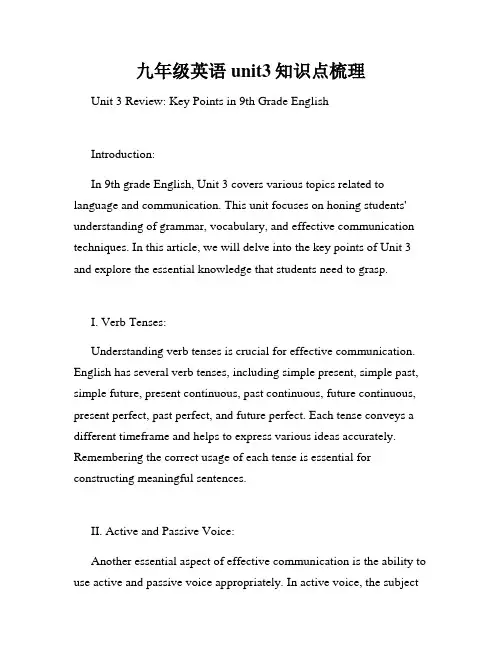
九年级英语unit3知识点梳理Unit 3 Review: Key Points in 9th Grade EnglishIntroduction:In 9th grade English, Unit 3 covers various topics related to language and communication. This unit focuses on honing students' understanding of grammar, vocabulary, and effective communication techniques. In this article, we will delve into the key points of Unit 3 and explore the essential knowledge that students need to grasp.I. Verb Tenses:Understanding verb tenses is crucial for effective communication. English has several verb tenses, including simple present, simple past, simple future, present continuous, past continuous, future continuous, present perfect, past perfect, and future perfect. Each tense conveys a different timeframe and helps to express various ideas accurately. Remembering the correct usage of each tense is essential for constructing meaningful sentences.II. Active and Passive Voice:Another essential aspect of effective communication is the ability to use active and passive voice appropriately. In active voice, the subjectperforms the action, while in passive voice, the subject receives the action. Knowing when to use active or passive voice can help convey a message more forcefully or emphasize the recipient of an action.III. Vocabulary Development:Expanding one's vocabulary is vital for improving communication skills. Unit 3 introduces new words and phrases related to different themes, such as education, technology, and travel. Building a strong vocabulary not only enhances speaking and writing but also improves overall comprehension.IV. Idioms and Phrases:Idioms and phrases are expressions that go beyond the literal meaning of their individual words. Unit 3 provides opportunities to learn and practice commonly used idioms and phrases. Mastering idiomatic expressions adds depth and color to one's language usage while fostering a deeper understanding of cultural nuances.V. Reading Comprehension:Unit 3 also focuses on improving reading comprehension skills. Students will encounter various texts, including articles, stories, and informative passages. They will be tasked with understanding the mainideas, identifying supporting details, and recognizing rhetorical devices used by authors. Developing effective reading strategies will enable students to extract meaning from texts efficiently.VI. Writing Skills:In this unit, emphasis is placed on enhancing writing skills. Students will learn about different types of writing, such as narratives, descriptive essays, and persuasive essays. They will be guided on proper structure, grammar usage, and incorporating suitable vocabulary. Practicing various writing styles helps students express their ideas cogently and encourages creativity.Conclusion:Unit 3 encompasses a wide range of essential English language skills, including verb tenses, active and passive voice, vocabulary development, idioms and phrases, reading comprehension, and writing skills. Mastering these key points will significantly enhance students' ability to communicate effectively in both spoken and written English. By solidifying their understanding of these concepts, students will become more confident and proficient in using the English language, setting a solid foundation for their future language learning endeavors.。
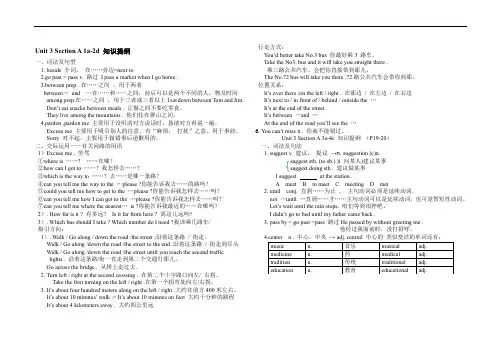
Unit 3 Section A 1a-2d 知识提纲一、词法及句型1. beside 介词,在……旁边=next to2.go past = pass v. 路过I pass a market when I go home .3.between prep. 在……之间,用于两者between…and …在……和……之间,前后可以是两个不同的人,物及时间among prep.在……之间,用于三者或三者以上I sat down between Tom and Jim .Don’t eat snacks between meals . 正餐之间不要吃零食。
They live among the mountains . 他们住在群山之间。
4.pardon ,pardon me 主要用于没听清对方说话时,恳请对方再说一遍。
Excuse me 主要用于吸引别人的注意,有“麻烦,打扰”之意。
用于事前。
Sorry 对不起,主要用于做错事后道歉用的。
二、交际运用——有关问路的用语1)Excuse me , 劳驾①where is ……? ……在哪?②how can I get to ……?我怎样去……?③which is the way to ……?去……是哪一条路?④can you tell me the way to the …please ?你能告诉我去……的路吗?⑤could you tell me how to get to the …please ?你能告诉我怎样去……吗?⑥can you tell me how I can get to the …please ?你能告诉我怎样去……吗?⑦can you tell me where the nearest…is ?你能告诉我最近的……在哪吗?2). How far is it ? 有多远?Is it far from here ? 离这儿远吗?3). Which bus should I take ? Which number do I need ?我该乘几路车/指引方向:1). Walk / Go along / down the road /the street ;沿着这条路/ 街走。
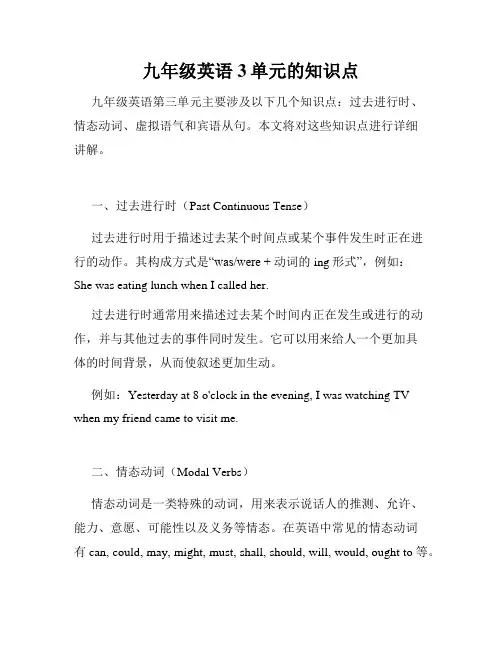
九年级英语3单元的知识点九年级英语第三单元主要涉及以下几个知识点:过去进行时、情态动词、虚拟语气和宾语从句。
本文将对这些知识点进行详细讲解。
一、过去进行时(Past Continuous Tense)过去进行时用于描述过去某个时间点或某个事件发生时正在进行的动作。
其构成方式是“was/were + 动词的ing形式”,例如:She was eating lunch when I called her.过去进行时通常用来描述过去某个时间内正在发生或进行的动作,并与其他过去的事件同时发生。
它可以用来给人一个更加具体的时间背景,从而使叙述更加生动。
例如:Yesterday at 8 o'clock in the evening, I was watching TV when my friend came to visit me.二、情态动词(Modal Verbs)情态动词是一类特殊的动词,用来表示说话人的推测、允许、能力、意愿、可能性以及义务等情态。
在英语中常见的情态动词有can, could, may, might, must, shall, should, will, would, ought to等。
情态动词的用法多种多样,根据不同的语境有不同的含义和用法。
例如,can表示能力,may表示允许,must表示必须等。
情态动词在句子中通常与动词原形搭配使用。
例如:You must finish your homework before going out to play.表示“你必须在出去玩之前完成作业”。
三、虚拟语气(Subjunctive Mood)虚拟语气用于表示与事实相反、假设、愿望、建议等非真实情况。
主要包括虚拟条件句、虚拟愿望句、虚拟建议句等。
虚拟语气的构成方式多样,根据不同的情况采用不同的形式。
例如,如果我们想表达对于过去的事实的惋惜或遗憾,可以使用“should have + 过去分词”的形式。
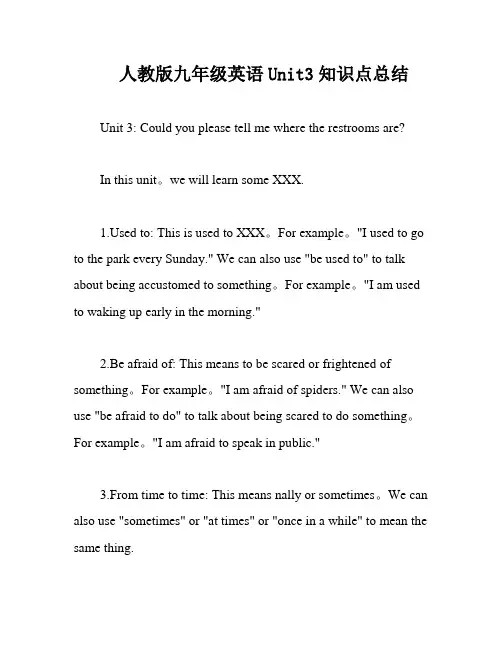
人教版九年级英语Unit3知识点总结Unit 3: Could you please tell me where the restrooms are?In this unit。
we will learn some XXX.ed to: This is used to XXX。
For example。
"I used to go to the park every Sunday." We can also use "be used to" to talk about being accustomed to something。
For example。
"I am used to waking up early in the morning."2.Be afraid of: This means to be scared or frightened of something。
For example。
"I am afraid of spiders." We can also use "be afraid to do" to talk about being scared to do something。
For example。
"I am afraid to speak in public."3.From time to time: This means nally or sometimes。
We can also use "sometimes" or "at times" or "once in a while" to mean the same thing.4.XXX red: This means to change color to red。
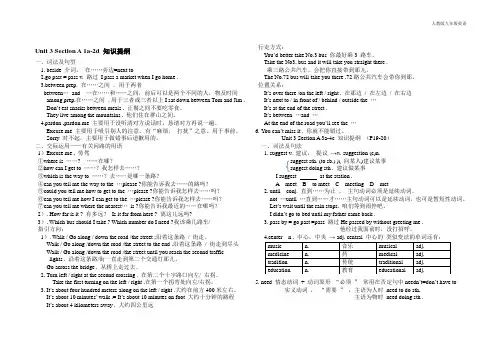
Unit 3 Section A 1a-2d 知识提纲一、词法及句型1. beside 介词,在……旁边=next to2.go past = pass v. 路过I pass a market when I go home .3.between prep. 在……之间,用于两者between…and …在……和……之间,前后可以是两个不同的人,物及时间among prep.在……之间,用于三者或三者以上I sat down between Tom and Jim .Don’t eat snacks between meals . 正餐之间不要吃零食。
They live among the mountains . 他们住在群山之间。
4.pardon ,pardon me 主要用于没听清对方说话时,恳请对方再说一遍。
Excuse me 主要用于吸引别人的注意,有“麻烦,打扰”之意。
用于事前。
Sorry 对不起,主要用于做错事后道歉用的。
二、交际运用——有关问路的用语1)Excuse me , 劳驾①where is ……? ……在哪?②how can I get to ……?我怎样去……?③which is the way to ……?去……是哪一条路?④can you tell me the way to the …please ?你能告诉我去……的路吗?⑤could you tell me how to get to the …please ?你能告诉我怎样去……吗?⑥can you tell me how I can get to the …please ?你能告诉我怎样去……吗?⑦can you tell me where the nearest…is ?你能告诉我最近的……在哪吗?2). How far is it ? 有多远?Is it far from here ? 离这儿远吗?3). Which bus should I take ? Which number do I need ?我该乘几路车/指引方向:1). Walk / Go along / down the road /the street ;沿着这条路/ 街走。
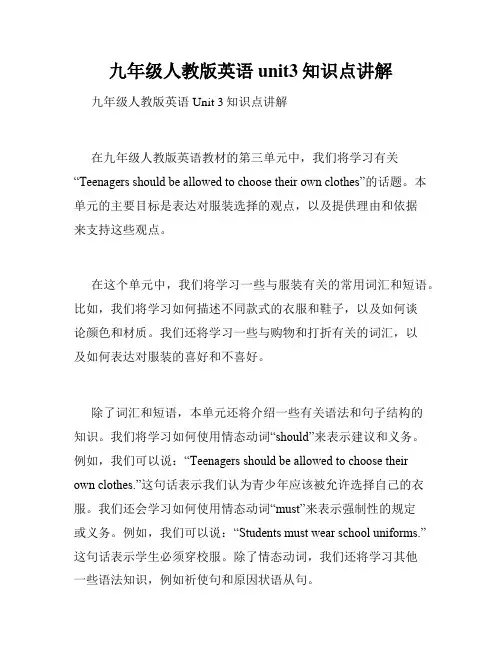
九年级人教版英语unit3知识点讲解九年级人教版英语Unit 3知识点讲解在九年级人教版英语教材的第三单元中,我们将学习有关“Teenagers should be allowed to choose their own clothes”的话题。
本单元的主要目标是表达对服装选择的观点,以及提供理由和依据来支持这些观点。
在这个单元中,我们将学习一些与服装有关的常用词汇和短语。
比如,我们将学习如何描述不同款式的衣服和鞋子,以及如何谈论颜色和材质。
我们还将学习一些与购物和打折有关的词汇,以及如何表达对服装的喜好和不喜好。
除了词汇和短语,本单元还将介绍一些有关语法和句子结构的知识。
我们将学习如何使用情态动词“should”来表示建议和义务。
例如,我们可以说:“Teenagers should be allowed to choose their own clothes.”这句话表示我们认为青少年应该被允许选择自己的衣服。
我们还会学习如何使用情态动词“must”来表示强制性的规定或义务。
例如,我们可以说:“Students must wear school uniforms.”这句话表示学生必须穿校服。
除了情态动词,我们还将学习其他一些语法知识,例如祈使句和原因状语从句。
在本单元中,我们也将学习如何进行听力和口语练习。
我们将听一些关于服装和购物的对话和短文,并回答一些与之相关的问题。
这将有助于提高我们的听力技巧和口语表达能力。
此外,我们还将进行一些角色扮演的练习,扮演不同的角色来表达对服装选择的观点。
学习这个话题不仅可以帮助我们扩展词汇和语法知识,还可以促进我们思考和表达个人观点的能力。
通过探讨服装选择的问题,我们可以思考为什么有些人喜欢流行的衣服,而另一些人喜欢传统的款式。
我们可以讨论服装与个人身份和社会观念之间的关系。
此外,我们还可以思考为什么学校有着对学生着装的规定,以及这些规定背后的原因。
总之,九年级人教版英语教材的第三单元提供了丰富的词汇、语法和口语练习,以及引发思考和讨论的话题。
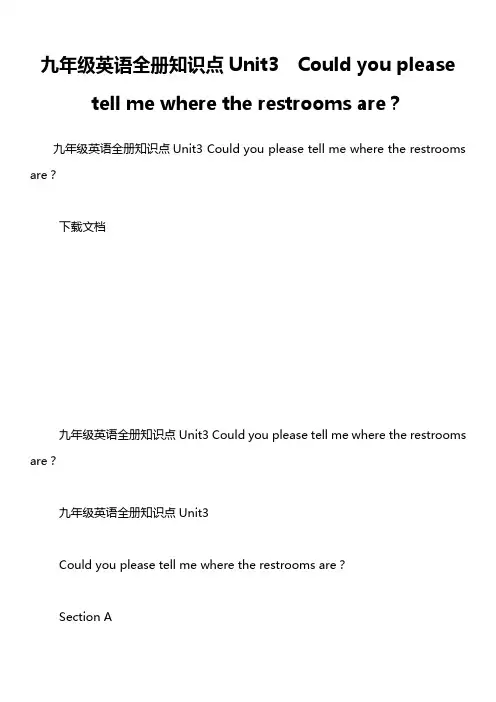
九年级英语全册知识点Unit3 Could you please tell me where the restrooms are?九年级英语全册知识点Unit3 Could you please tell me where the restrooms are?下载文档九年级英语全册知识点Unit3 Could you please tell me where the restrooms are?九年级英语全册知识点Unit3Could you please tell me where the restrooms are?Section AExcuse me. Could you tell /show me the way to...? Could you please tell me how to get to...?Do you know if there is a... around here?2.beside在…旁边besides除…… 之外,(还)……eg:We also like chemistry besides physics. beside在……旁边eg:A girl is standing beside the tree.between...and...指二者eg:The letter B is between A and C. among指三者或三者以上eg:The village lies among the mountains.4.pardonpardon sb. for (doing) sth.原谅/宽恕某人做某事5.rush迅速行动;急促eg: He rushed into the room and took some money.匆忙;繁忙in a rusheg: No matter what she does, she is always in a rush.rush hour( 上下班时的) 交通高峰期eg:If you go now, you’re likely to hit the rush hour.6.suggest建议;提议eg:The old man suggests giving back the food to these villagers. advise sb. to do sth.建议某人做某事7.pass by路过;经过不注意;忽视pass sb. by(机会) ( 从某人旁边) 过去pass sb. sth.把某物传递给某人=pass sth. to sb.pass away8.宾语从句(二)if/whether不能省略eg:I wonder if you are a teacher.what,which,whose,whom在从句中作一定的成分,如主语、宾语、定语等When,where,why,how作状语客观事实、普遍真理、自然现象或习惯性动作等,从句用一般现在时Section B1.convenientadj.便利的;方便的It’s convenient for sb. to do sth.不可数方便,便利利的事物(或设施) 2.corner拐角;角落in the corner在拐角的里面on the corner 在拐角之上at the corner在拐角边3.politely more polite更有礼貌的less polite不如……有礼貌的4.whom谁;什么人介词之后只能用whomeg: With whom did you go shopping last weekend, Lucy ?5.municate和某人交流municate with sb.和某人交流6.happen发生;出现sth.+ happens/happened + 地点/ 时间某地/ 某时发生了某事sth.+ happens/happened+to sb.某人出了某事( 常指不好的事)sb.+ happens/happened+to do sth. 某人碰巧做某事It happens/happened that...碰巧或恰好发生……7. look forward to期待;期望后+n./pron./v.ingSection A1.问路Excuse me. Could you tell /show me the way to...? Could you please tell me how to get to...?Do you know if there is a... around here?2.beside在…旁边besides除…… 之外,(还)……eg:We also like chemistry besides physics. beside在……旁边eg:A girl is standing beside the tree.3.辨析between...and...指二者eg:The letter B is between A and C. among指三者或三者以上eg:The village lies among the mountains.4.pardonpardon sb. for (doing) sth.原谅/宽恕某人做某事5.rush迅速行动;急促eg: He rushed into the room and took some money.匆忙;繁忙in a rusheg: No matter what she does, she is always in a rush.rush hour( 上下班时的) 交通高峰期eg:If you go now, you’re likely to hit the rush hour.6.suggest建议;提议eg:The old man suggests giving back the food to these villagers. advise sb. to do sth.建议某人做某事7.pass by路过;经过不注意;忽视pass sb. by(机会) ( 从某人旁边) 过去pass sb. sth.把某物传递给某人=pass sth. to sb.pass away8.宾语从句(二)if/whether不能省略eg:I wonder if you are a teacher.what,which,whose,whom在从句中作一定的成分,如主语、宾语、定语等When,where,why,how作状语客观事实、普遍真理、自然现象或习惯性动作等,从句用一般现在时Section B1.convenientadj.It’s convenient for sb. to do sth.不可数方便,便利利的事物(或设施)2.corner拐角;角落in the corner在拐角的里面on the corner在拐角之上at the corner3.politelymore polite更有礼貌的less polite不如……有礼貌的4.whom谁;什么人介词之后只能用whomeg: With whom did you go shopping last weekend, Lucy ?5.municate和某人交流和某人交流6.happen发生;出现sth.+ happens/happened + 地点/ 时间某地/ 某时发生了某事sth.+ happens/happened+to sb.某人出了某事( 常指不好的事)sb.+ happens/happened+to do sth. 某人碰巧做某事It happens/happened that...碰巧或恰好发生……期待;期望后+n./pron./v.ing。
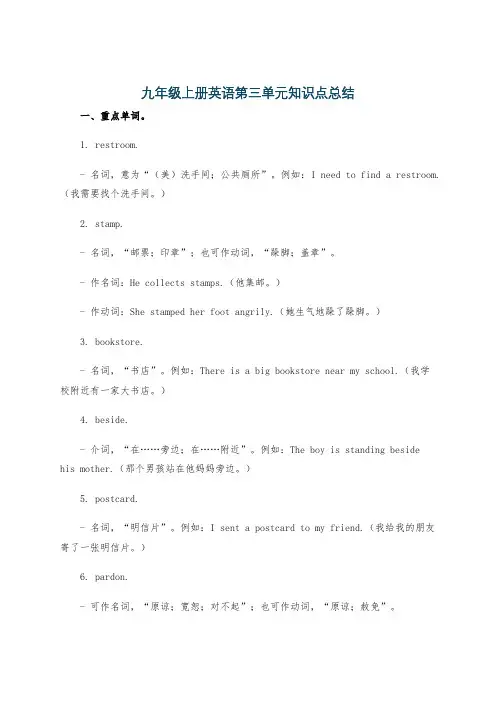
九年级上册英语第三单元知识点总结一、重点单词。
1. restroom.- 名词,意为“(美)洗手间;公共厕所”。
例如:I need to find a restroom.(我需要找个洗手间。
)2. stamp.- 名词,“邮票;印章”;也可作动词,“跺脚;盖章”。
- 作名词:He collects stamps.(他集邮。
)- 作动词:She stamped her foot angrily.(她生气地跺了跺脚。
)3. bookstore.- 名词,“书店”。
例如:There is a big bookstore near my school.(我学校附近有一家大书店。
)4. beside.- 介词,“在……旁边;在……附近”。
例如:The boy is standing besidehis mother.(那个男孩站在他妈妈旁边。
)5. postcard.- 名词,“明信片”。
例如:I sent a postcard to my friend.(我给我的朋友寄了一张明信片。
)6. pardon.- 可作名词,“原谅;宽恕;对不起”;也可作动词,“原谅;赦免”。
- 作名词:I beg your pardon.(请再说一遍。
)- 作动词:Pardon me for being late.(原谅我迟到了。
)7. washroom.- 名词,“洗手间;厕所”(尤指公共建筑物内的)。
例如:The washroom is on the second floor.(洗手间在二楼。
)8. bathroom.- 名词,“浴室;洗手间”。
例如:There is a bathtub in the bathroom.(浴室里有一个浴缸。
)9. normal.- 形容词,“正常的;一般的”。
例如:It's normal to feel tired after a long day.(漫长的一天后感到疲倦是正常的。
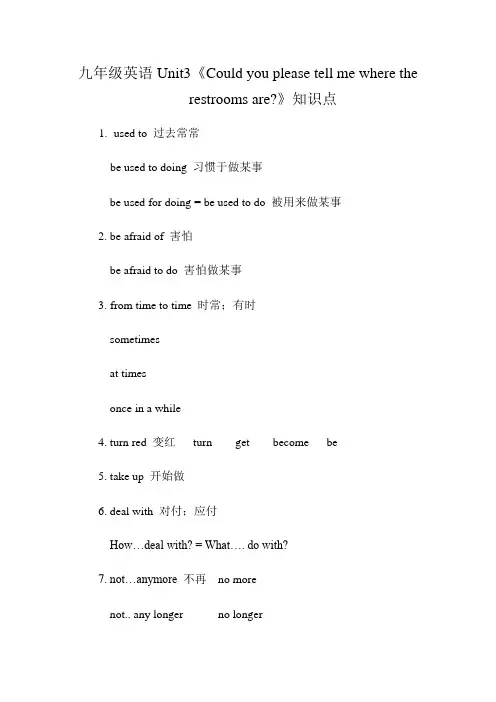
九年级英语Unit3《Could you please tell me where therestrooms are?》知识点ed to 过去常常be used to doing 习惯于做某事be used for doing = be used to do 被用来做某事2. be afraid of 害怕be afraid to do 害怕做某事3. from time to time 时常;有时sometimesat timesonce in a while4. turn red 变红turn get become be5. take up 开始做6. deal with 对付;应付How…deal with? = What…. do with?7. not…anymore 不再no morenot.. any longer no longer8. tons of attention 很多关注lots of=a lot of=plenty of9. worry about 担心be worried about10. be careful = take care = look out当心11. hang out 闲逛hang-hung-hung hang-hanged-hanged12. give up 放弃look forward to盼望put off 推迟pay attention to 注意concentrate on 集中注意力have fun玩的开心have trouble in doing 做某事有困难can’t stand 不能忍受…13. think about 考虑think over 仔细考虑think hard 苦苦思索14. a very small number of… 极少数的……a large number of15. be alone 独处alone & lonely16. give a speech 做演讲17.宾语从句;宾语从句在复合句中作主句的宾语。
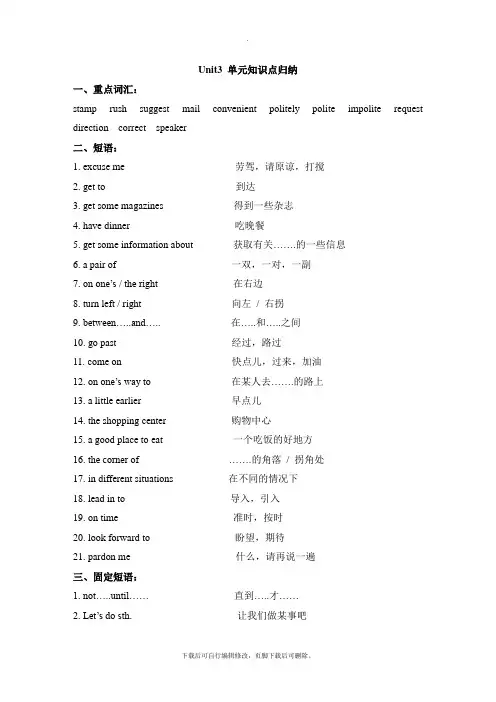
Unit3 单元知识点归纳一、重点词汇:stamp rush suggest mail convenient politely polite impolite request direction correct speaker二、短语:1. excuse me 劳驾,请原谅,打搅2. get to 到达3. get some magazines 得到一些杂志4. have dinner 吃晚餐5. get some information about 获取有关…….的一些信息6. a pair of 一双,一对,一副7. on one’s / the right 在右边8. turn left / right 向左/ 右拐9. between…..and….. 在…..和…..之间10. go past 经过,路过11. come on 快点儿,过来,加油12. on one’s way to 在某人去…….的路上13. a little earlier 早点儿14. the shopping center 购物中心15. a good place to eat 一个吃饭的好地方16. the corner of …….的角落/ 拐角处17. in different situations 在不同的情况下18. lead in to 导入,引入19. on time 准时,按时20. look forward to 盼望,期待21. pardon me 什么,请再说一遍三、固定短语:1. not…..until…… 直到…..才……2. Let’s do sth. 让我们做某事吧3. start doing sth. 开场做某事4. spend time doing sth. 花费时间做某事5. thank sb. for (doing) sth. 为〔做〕某事而感谢某人6. would like to do sth. 想要做某事7. look forward to doing sth. 盼望,期待做某事四、重点句型:1. Excuse me, could you please tell me how to get to the bookstore?打搅一下,请你告诉我如何去书店好吗?2. Excuse me, do you know where I can get some postcards?请问,你知道在哪里可以买到一些明信片吗?3. I wonder where we should go next.我想知道接下来我们应该去哪儿。
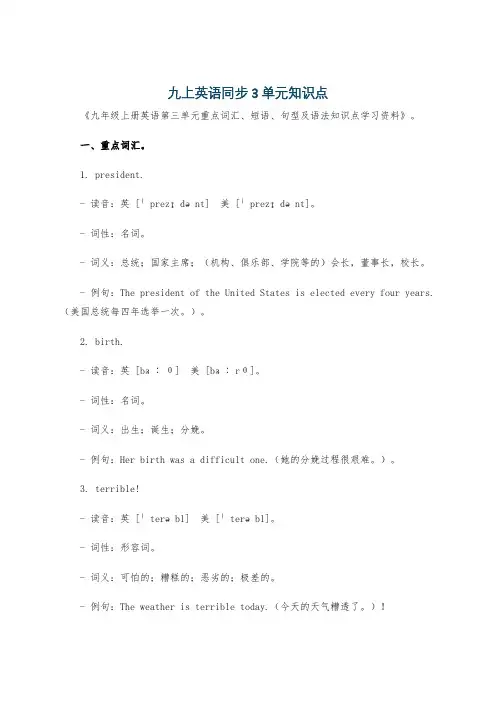
九上英语同步3单元知识点《九年级上册英语第三单元重点词汇、短语、句型及语法知识点学习资料》。
一、重点词汇。
1. president.- 读音:英 [ˈprezɪdənt] 美 [ˈprezɪdənt]。
- 词性:名词。
- 词义:总统;国家主席;(机构、俱乐部、学院等的)会长,董事长,校长。
- 例句:The president of the United States is elected every four years.(美国总统每四年选举一次。
)。
2. birth.- 读音:英 [bɜːθ] 美 [bɜːrθ]。
- 词性:名词。
- 词义:出生;诞生;分娩。
- 例句:Her birth was a difficult one.(她的分娩过程很艰难。
)。
3. terrible!- 读音:英 [ˈterəbl] 美 [ˈterəbl]。
- 词性:形容词。
- 词义:可怕的;糟糕的;恶劣的;极差的。
- 例句:The weather is terrible today.(今天的天气糟透了。
)!二、重点短语。
1. be born.- 词义:出生。
- 例句:He was born in a small village.(他出生在一个小村庄。
)。
2. take care of.- 词义:照顾;照料;爱护。
- 例句:She takes care of her sick mother at home.(她在家照顾生病的母亲。
)。
3. give up.- 词义:放弃;戒除。
- 例句:He gave up smoking last year.(他去年戒烟了。
)。
三、重点句型。
1. He was born in a poor family in 1950.- 分析:这是一个一般过去时的被动语态句子,描述过去发生的出生事件。
“be born”是常用的表示出生的短语。
- 例句仿写:She was born in a big city in 1985.(她1985年出生在一个大城市。
英语九年级知识点总结第三单元第三单元主要讲述英语中的一些重要知识点,如现在完成时、情态动词与被动语态等。
下面就来对这些知识点进行总结和探讨。
一、现在完成时现在完成时是英语中最常用的时态之一,用于表示过去发生但对现在有影响的动作或状态。
它的构成是由助动词"have/has"和动词的过去分词构成。
例如,"I have finished my homework."(我已经完成了作业。
)现在完成时在一些特定的情况下也可以表示将来发生的动作,这时需要结合具体的时间状语或上下文来确定。
例如,"I have booked a ticket for tomorrow."(我已经订好了明天的机票。
)二、情态动词情态动词在英语中的作用非常重要,它们用来表示说话人对某种动作或状态的态度、意愿、推测等。
常见的情态动词有can、could、may、might、must、shall、should、will、would等。
情态动词有一些固定的搭配和用法,比如can用来表示能力、may用来表示许可、must用来表示推测、should用来表示建议等。
例如,"You should eat more vegetables."(你应该多吃蔬菜。
)情态动词后面通常接动词原形,不需要变化。
例如,"I can swim."(我会游泳。
)三、被动语态被动语态是在英语句子中非常常见的一种结构,它用于强调动作的承受者而不是执行者。
被动语态的结构是由"be" + 过去分词构成。
例如,"The book is written by him."(这本书是他写的。
)被动语态的使用可以让句子的重点发生改变,使句子更加严谨和客观。
例如,"The window was broken by the wind."(窗户是风把它打破的。
九年级英语Unit 3知识点汇总九年级英语Unit3知识点汇总Unit3知识点一、重点短语turnleft/right向左/右转nne’sleft/right在某人的左/右边galngainStreet沿着主大街走havedinner用饭gtthethirdflr去三楼arfrresting休息室bespeialabut有……独特的地方pardne请再说一次en过来;加油nene’sat在去的路上sethingteat一些吃的东西hldne’shand抓住某人的手ailaletter寄信passb途经arband摇滚乐队intheshppingenter在购物中心insesituatins在某些场合parne’sar停车anundergrundparinglt地下停车库suhas例如thansbfrdingsth为…感激某人lfrardt…期盼…eetsbfrthefirsttie第一次见到某人inarushtdsth仓促地做某事benvenienttdsth做某事很方便二、重点知识点1名词能够用来修饰另一个名词,表示材料、类别、用途等。
名词作定语时常利用单数形式。
ashefatr鞋厂afruitshp水果店注意:①sprt作定语时经常使用复数形式。
asprtsarsprtsshes②an和an作定语时有数的转变,其单复数形式与其所修饰的名词的数维持一致。
aan/anteaherten/enteahers2past,ver,arss与thrugh辨析3rush用法作不及物动词时,意为“冲;奔;猛攻”。
rush作及物动词时,意为“催促”rush还可作名词,意为“冲进;匆促;急流”。
如:inarush=inahurr慌忙地;急速地4suggest用法suggest+名词。
如:Hesuggestedat-da-lngstainBeiingntheahesuggest+动名词。
如:fathersuggestedallingfradtratnesuggest+that从句。
九年级英语上册第三单元知识点一、重要词汇1.go out with friends 和朋友一起外出 2. have part-time jobs 做兼职工作3.choose one’s own clothes 选择某人自己的衣服4. spend time with friends 和朋友们共渡时光5. at that age 在那个年龄6.stay up 熬夜7. get up early 早起8. learn a lot from each other 互相学到很多9. on weekends在周末10.in the past 过去11. at present 现在12. in the future 将来13. old people’s home 养老院14. get one’s driver’s license 拿到某人的驾照15. go to the mall with friends 和朋友们一起去商场16. a good way to do sth. 做某事的好方法17. allow 允许,准许(1) allow doing sth 允许做某事Doctors don’t allow smoking in the hospital .They don’t allow parking here .(2) allow sb to do sth 允许某人做某事Mom allows me to watch tv on weekends .Parents should allow their children to go out with their friends .My father doesn’t allow me to drive a car .(3)be allowed to do sth 被允许做某事,获准做某事May I be allowed to use this computer ?They shouldn’t be allowed to act like this .They asked to be allowed to see her .(4) be not allowed to do sth 不被允许做某事People are not allowed to smoke here .18. instead (1) 位于句首, 表示“反而, 相反”I didn’t go to the cinema last night . instead, I watched a footballmatch on TV.The boy didn’t sing to the music , instead , he sang his own way .( 2 ) 位于句尾, 表示“作为代替”Mr smith was ill , so mr green was taking his class instead .I don’t like this one , please give me that instead .(3 ) instead of 后跟名词, 代词, 动名词, 介词短语.表示“代替, 而不是”I have come instead of my brother . He is ill .We walked down the stairs instead of taking the elevator ( 电梯) .He studies in the evening instead of during the day .19. present ( 1 ) 礼物, 礼品== gift Why not give him a card as a present ?what can I get him for a birthday present ?( 2 ) 目前, 现在I’m sorry he is out at present .Y ou have to forget the past and start living in the present .20. have \ get sth done 使某事完成,让别人做某事I’ll have \ get my hair cut tomorrow .Since you’re ill in bed , why not have \ get a letter written to your parents .Spring festival is coming . she has got a new coat made .21. decide 动词, “决定”decide to do sth决定做某事We decided to play soccer .decide on doing sth. 决定做某事I decided on buying the house .decide + that + 从句He decided that he would buy a new computer .decision 名词, “决定, 决心”make a decision 做决定make a decision to do sth== decide to do sth== make up one’s mind to do sth决定做某事I make a decision to study hard from now on .=== I decide to study hard from now on .===I make up my mind to study hard from now on .22. 动词think 后面的that 从句如果是否定意义,习惯上一般否定think , 而不是否定that 从句,即形式上否定了think ,而意义上却否定了that从句。
九年级unit3知识点总结九年级Unit 3知识点总结在九年级英语Unit 3的学习过程中,我们学习了许多重要的知识点,包括动词时态、被动语态、情态动词、形容词和副词的比较等。
下面是对这些知识点的总结:动词时态:动词时态是描述动作发生的时间的一种语法形式。
在九年级Unit 3中,我们学习了一些常见的动词时态,包括一般现在时、一般过去时、一般将来时等。
一般现在时用于表达现在的常态、经常性动作或客观事实,例如:"He often plays basketball after school."(他放学后经常打篮球。
)一般过去时用于表达过去发生的动作或状态,例如:"She visited her grandparents last weekend."(她上周末去看望了她的祖父母。
)一般将来时用于表达将要发生的动作,例如:"I will go to the cinema with my friends tomorrow."(我明天将和朋友们去电影院。
)被动语态:被动语态是指主语是动作的承受者,而不是执行者的一种语法形式。
在九年级Unit 3中,我们学习了如何构成和使用被动语态。
被动语态的构成通常是由助动词be和动词的过去分词构成,其中助动词be的形式取决于时态。
例如:"The book was written byMark Twain."(这本书是由马克·吐温写的。
)被动语态常用于强调动作的承受者或省略动作的执行者。
情态动词:情态动词是一类用于表示能力、可能性、请求、建议、允许等情态的助动词。
在九年级Unit 3中,我们学习了常见的情态动词,如can、could、may、might、shall、should、will、would等。
情态动词具有独特的用法,如表示能力的can,表示请求的could等。
例如:"Can you help me with my homework?"(你能帮我做作业吗?)形容词和副词的比较:形容词和副词的比较用于描述两者之间的程度或差异。
人教九年级unit3单元知识点九年级英语 Unit 3 单元知识点在九年级英语课程中,Unit 3 是一个重要的单元。
本文将重点介绍 Unit 3 中的一些知识点,包括动词时态、被动语态以及一些关于语法使用的技巧。
希望通过本文的介绍,可以帮助同学们更好地理解和掌握这些知识点。
一、动词时态在 Unit 3 中,我们需要掌握的动词时态主要有一般现在时、现在进行时、一般过去时以及将来时等。
这些时态在句子中的使用各有不同的用法和表达方式。
例如,一般现在时常用于表达客观事实、习惯性动作等,现在进行时则用于表达现阶段正在发生的动作,一般过去时则用于描述过去发生的事情,将来时则用于表示将来将要发生的动作或计划。
二、被动语态被动语态是九年级英语 Unit 3 中的另一个重点。
被动语态的构成主要是由助动词 be 的不同形式和及物动词的过去分词构成。
被动语态常用于强调动作的承受者,或者当我们不知道动作的执行者时可以使用被动语态。
在应用被动语态时,有些动词可以直接使用,而有些动词需要进行相应的词形变化。
三、语法技巧在学习九年级英语 Unit 3 过程中,我们还需要掌握一些语法使用的技巧。
例如,如何使用形容词和副词来修饰名词和动词;如何使用连词来连接句子和段落;如何使用适当的时态来描述过去、现在和将来等。
这些技巧的掌握不仅可以在 Unit 3 中得心应手,也为同学们今后的英语学习奠定了坚实的基础。
四、词汇与短语在 Unit 3 中,我们还会学习一些与旅行和旅游相关的词汇和短语。
比如,flight(飞行)、hotel(酒店)、passport(护照)、sightseeing(观光)等。
这些词汇和短语的学习可以拓展我们的词汇量,让我们的表达更加准确和丰富。
五、阅读与听力练习在学习 Unit 3 过程中,除了掌握相关的知识点之外,我们还需要进行阅读与听力的练习,以提高我们的综合能力。
通过阅读和听力练习,我们不仅可以增加对语言的理解和应用能力,还可以扩大我们的视野,增长文化知识。
Unit3 Could you please tell me where the restrooms are?重点句子分析1.could you please tell me where the restrooms are?请您告诉我洗手间在哪里好吗?could you please...?意为“请你。
好吗?”,是表示请求的礼貌用语,后接动词原形。
其否定形式是在please后加not。
---Could you please turn off the lights? ---Sure,I can.归纳拓展:表示请求时可用can,could,may,might表达,它们没有时态上的差别,只是could 比can,might比may在语气上要客气。
用can或could表示“请求”比较普遍,但在正式、庄重的场合用may或might为宜。
Could/Can you lend me some money,please?对could you please...?句型回答时,肯定回答可用sure./certainly./of course.等;否定回答可用sorry,I can’t./sorry,I’m afraid not.等。
---Could you please open the window?---Of course. /Sorry, I can’t.Because the windows are locked on the train.例:1.---Could you please _________the window? ---Sure,I________.A.open not,couldB.not open,couldC.not opening,canD.not open,can2.---Could you go shopping with me? ---__________.My father and I will go to Wuhan tomorrow.A.I think soB.Yes,I hope soC.I’m afraid soD.Sorry,I’m afraid not3.---_______,could you tell me the way to the Park Street?---The Park Street? Oh,go straight and turn left.You can’t miss it.A.All rightB.Never mindC.Excuse meD.Thank you4.---I seem to be lost.Could you tell me how I can get to the National Museum?---__________.You can take the No.3 bus to get there.A.Of course notB.I don’t knowC.CongratulationsD.Sure5.---Did you have a good weekend?---______.We enjoyed ourselves in an amusement park.A.I’m afraid notB.I don’t think soC.Of courseD.I hope not2.The Fine Arts Museum is really interesting.美术博物馆真的很有趣。
Unit3 Teenagers should be allowed to choose their own clothes. 熟记以下短语: 1. be allowed to do sth 被允许干… allow sb to do sth 允许某人干… allow doing sth 允许干… 2. sixteen-year-olds = sixteen-year-old boys and girls 16岁的孩子 3. part-time jobs 兼职工作 4. a driver’s license 驾照 5. on weekends 在周末 6. at that age 在那个年龄段 7. on school nights 在上学期间的每个晚上 8. stay up 熬夜 9. clean up (相当与及物动词) 清扫 10. fail (in) a test 考试不及格 11. take the test 参加考试 12. the other day 前几天 13. all my classmates 我所有的同学 14. concentrate on 全神贯注于 15. be good for 对…有益 16. in groups 成群的,按组的 17. get noisy 吵闹(系表结构) 18. learn from 向某人学习 19. at present 目前,现在 20. have an opportunity to do sth 有做…的机会 21.English-English dictionary 英英词典 22. at least 至少 23.eight hours’ sleep a night 每晚8小时的睡眠 24. an old people’s home 敬老院 25. take time to do sth 花费时间干… 26. primary schools 小学 27. have…off 放假,休息 28. reply to 回答,答复 29. get in the way of 妨碍 30. a professional athlete 职业运动员 31. achieve one’s dreams 实现梦想 32. think about 思考,考虑 33. in the end 最后,终于 34. be serious about 对…热忠/极感兴趣 35. spend…on + n. spend …(in) + v-ing 在…上花费时间/金钱 36. care about 关心,担心,在乎 37. agree with 同意… 1.语态: ①英语有两种语态:主动语态和补动语态 主动语态表示是动作的执行者 被动语态表示主语是动作的承受者 Cats eat fish. (主动语态)猫吃鱼。
Fish is eaten by cats. (被动语态) 鱼被猫吃。 ②被动语态的构成 由“助动词be +及物动词的过去分词”构成 助动词be 有人称、数和时态的变化,其变化规则与be 作为连系动词时完全一样。 时态 被动语态结构 例句
一般现在 时
am
are +过去分词 is
English is spoken in many
countries.
一般过去 时 was +过去分词
were + 过去分词 This bridge was built in 1989.
情 态 动 词
can/should
may +be+过去分词 must/…
The work must be done right
now.
③被动语态的用法 当我们不知道谁是动作的执行者,或者没有必要指出谁是动作的执行者,或者只需强调动作的承受者时,要用被动语态。
固定搭配、词语辨析: 2. Teenagers should be allowed to choose their own clothes. allow sb. to do sth. 允许某人做某事(主动语态)如: Mother allows me to watch TV every night. 妈妈允许我每晚看电视。 be allowed to do sth. 被允许做某事(被动语态)如: Lily is allowed to go to Qinzhou. 莉莉被允许去钦州。 3. Sixteen-year-olds should be allowed to get their ears pierced. get their ears pierced 穿耳洞 Sixteen-year-olds=sixteen-year-old teenagers 让/使(别人)做某事 get sth. done (过去分词) have sth. done (过去分词) 如:I get my car mended. = I have my car mended. 我让别人修好我的车
Practice 1. Do you often allow ______ until 11:00 pm? A to stay up B stay up C staying up D and stay up 2. Do you think we should be allowed ______our own decisions? A to make B making C make D to making 3. It _____ to drive after drinking wine. A is allowed B is not allowed C is made D is welcomed 写出下列句子同义句 1. Sixteen-year-old teenagers can work at places like Target and Walmart. ________ can work at places like Target and Walmart. 2. Why not have your hair cut? Why not ______ your hair _____?
4. They aren’t serious enough. enough 足够 形容词+enough 如:beautiful enough 足够漂亮 enough+名词 如:enough food 足够食物 enough to 足够…去做… 如:I have enough money to go to Beijing. 我有足够的钱去北京。 She is old enough to go to school. 她够大去读书了。
5 He should stop wearing that silly earring. . stop doing sth. 停止做某事 Please stop speaking.请停止说话。 stop to do sth. 停止下来去做其他事 Please stop to speak. 请停下来去说话。
Practice: 用含enough的短语完成句子 1. I have ______ _______ ______ (足够的位置提供给)everyong. 2. The boy isn’t _____ ______ ______ (年龄不够) go to school。 3. Three pears are ______ ______ (够多) us to last half an hour.
用括号内所给词的适当形式填空。 1. It’s time for lunch. Let’s stop _____ (have) a rest. 2. As soon as the teacher came in, the students stopped ______ (talk). 3. Stop ______ laugh and listen to me. 4. Nothing can _______ (stop) the wheel of the history from _____(go) forward.
8. 倒装句:----We have a lot of rules at my house. ----So do we. 由so+助动词(be/do/will/have)/情态动词+主语 意为:…也是一样 She is a student. So am I. 她是一个学生,我也是。 She went to school just now. So did I . 她刚才去学校了,我也是 She has finished the work. So have I . 她已经完成了工作,我也完成了。 She will go to school. So will he. 她将去学校,他也是。 10. Find someone who is allowed to stay up until 11:00pm Stay up 不睡觉,熬夜 Until 用于肯定句中,谓语动词要用延续性动词,表示这个动作一致延续到until发生的时间为止 Until 用在否定句中,谓语动词要用短暂性动词,表示这一动作从until所表示的时间开始。